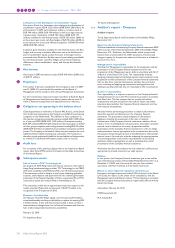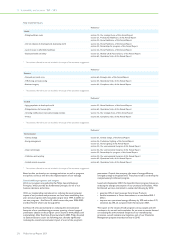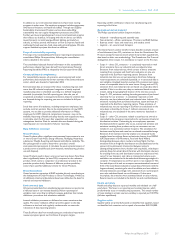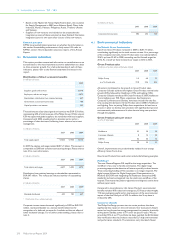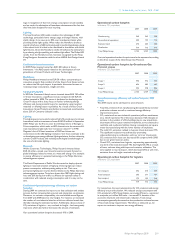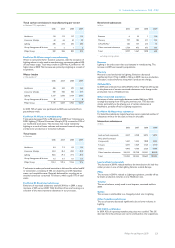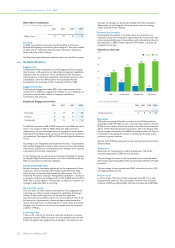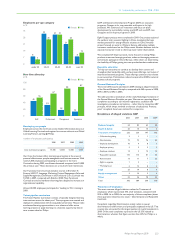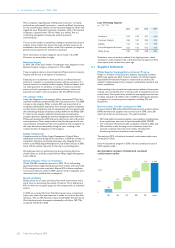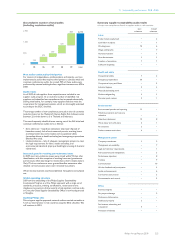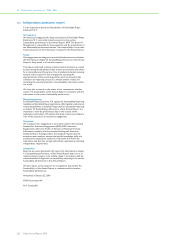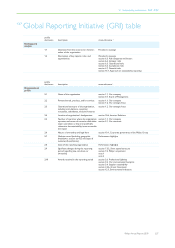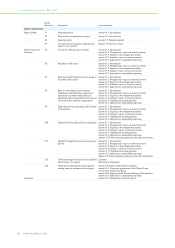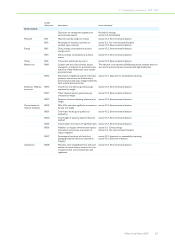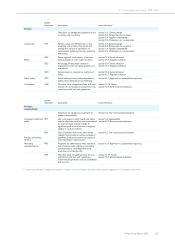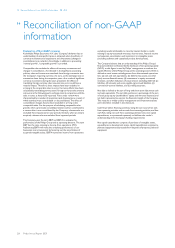Philips 2009 Annual Report Download - page 224
Download and view the complete annual report
Please find page 224 of the 2009 Philips annual report below. You can navigate through the pages in the report by either clicking on the pages listed below, or by using the keyword search tool below to find specific information within the annual report.
Most complaints regarding lack of Respectful treatment – primarily
verbal abuse and (sexual) harassment – come from Brazil. Accounting
for the second largest number of total reported allegations, Brazil also
logged the most Respectful treatment complaints (33% of all reported
complaints, compared with 17% for Philips as a whole). We are
conducting management training and enhancing internal
communication.
The rise in the number of complaints relating to remuneration issues is
striking. Closer analysis has shown that many of these issues can be
attributed to the economic decline, which led to pressure on wages in
general and on payment for overtime in particular.
More information on these categories can be found in the GBP
Directives on www.philips.com/gbp.
Business Integrity
In 2009, 28% of the total number of complaints were allegations in the
Business Integrity category, compared to 17% in 2008.
These complaints relate to the principle that Philips insists on honesty,
integrity and fairness in all aspects of its business.
Employees are not allowed to have any direct or indirect financial
interest in a supplier or competing company with the exception of a
financial interest in a publicly traded company. Philips companies shall
not make payments or donations, in money or in kind, to political
parties, political organizations or individual politicians, unless such
payments are made in strict accordance with the GBP Directives.
The category Other
Lastly, the allegations in the category Other represented 17% of the
reported complaints compared with 22% in the previous year. The 2008
increase in the category Other to above 20% was due primarily to
complaints submitted by employees from recently acquired companies
in which the pre-acquisition style of management was inconsistent with
the underlying principles of business conduct defined in the Philips GBP.
To improve this situation dedicated training and communication
programs geared to aligning the previous management style with that of
Philips were developed in 2009 and were rolled out to each of the major
new acquisitions. Closer analysis shows that the disproportional over-
representation of employees from new acquisitions with complaints on
this topic decreased substantially during the year, resulting in the
reduced number of allegations in this category.
Supply management
Compliance with the Philips Supply Management Code of Ethics
significantly increased during the last two years. In 2009 the number of
complaints relating to purchasing employees who allegedly did not
adhere to the Philips Supply Management Code of Ethics was, as in 2008,
about half the number reported on this topic in preceding years.
All employees who are performing (certain) purchasing functions
should adhere to and fully comply with the Philips Supply Management
Code of Ethics.
Actual violations versus non-violations
Of the 318 GBP complaints reported in 2009, 75 are still pending
(particularly those lodged during the last three months of the year) and
243 investigations were completed. Almost 40% of these complaints
were actual violations, while in 2008 a quarter of the complaints were
determined to be justified after investigation.
Health and Safety
Philips strives for an injury and illness-free work environment, with a
sharp focus on decreasing the number of injuries. This is defined as a
KPI, on which we set yearly targets for the company and our individual
sectors.
In 2009 we recorded 427 Lost Workday Injuries cases, occupational
injury cases where the injured person is unable to work the day after
the injury. This is a 34% decrease compared with 2008. The rate of Lost
Workday Injuries also decreased substantially to 0.44 per 100 FTEs,
compared with 0.68 in 2008.
Lost Workday Injuries
per 100 FTEs
2006 2007 2008 2009
Healthcare 0.37 0.29 0.27 0.20
Consumer Lifestyle 0.66 0.61 0.44 0.26
Lighting 1.27 1.35 1.17 0.76
Group Management & Services 0.23 0.12 0.12 0.07
Philips Group 0.78 0.81 0.68 0.44
Reductions were particularly realized in the Lighting sector, which
continues to make progress with a dedicated action program to drive
down injury levels started three years ago.
13.5 Supplier indicators
Philips Supplier Sustainability Involvement Program
Philips is a member of the Electronic Industry Citizenship Coalition
(EICC) and applies the EICC Code of Conduct. The Philips Supplier
Sustainability Involvement Program is meant both to enhance the
supplier’s understanding of the company’s sustainability standards and
ensure compliance.
Understanding of our compliance requirements is enhanced by a system
of quick scans conducted prior to formal audits to identify and correct
critical issues. This is particularly valuable for new supply bases that have
not been exposed to the EICC Code. In 2009 we paid special attention
to suppliers of recently acquired companies, including PCL and
Respironics.
Record number of audits conducted in 2009
A record total of 858 audits of Bill of Material and non-product related
(NPR) identified risk suppliers were carried out in 2009, some 286
audits more than the previous year. The audits included:
• 249 initial audits of potential suppliers, new suppliers including those
from acquisitions, new sites or spend exceeding EUR 100,000,
• 111 continual conformance audits at suppliers audited in 2006, and
• 498 resolution audits focusing on zero-tolerance issues (for
example: continual seven-day work weeks, immediate life
threatening situations, hazardous waste handling).
The majority (72%) of initial and continual conformance audits were
conducted in China.
Since we started the program in 2005, we have conducted a total of
2,212 supplier audits.
Accumulative number of initial and continual
conformance audits
1,500
1,000
500
0
150
05
365
06
166
07
277
08
360
09
1,318
total
13 Sustainability performance 13.4 - 13.5
224 Philips Annual Report 2009


